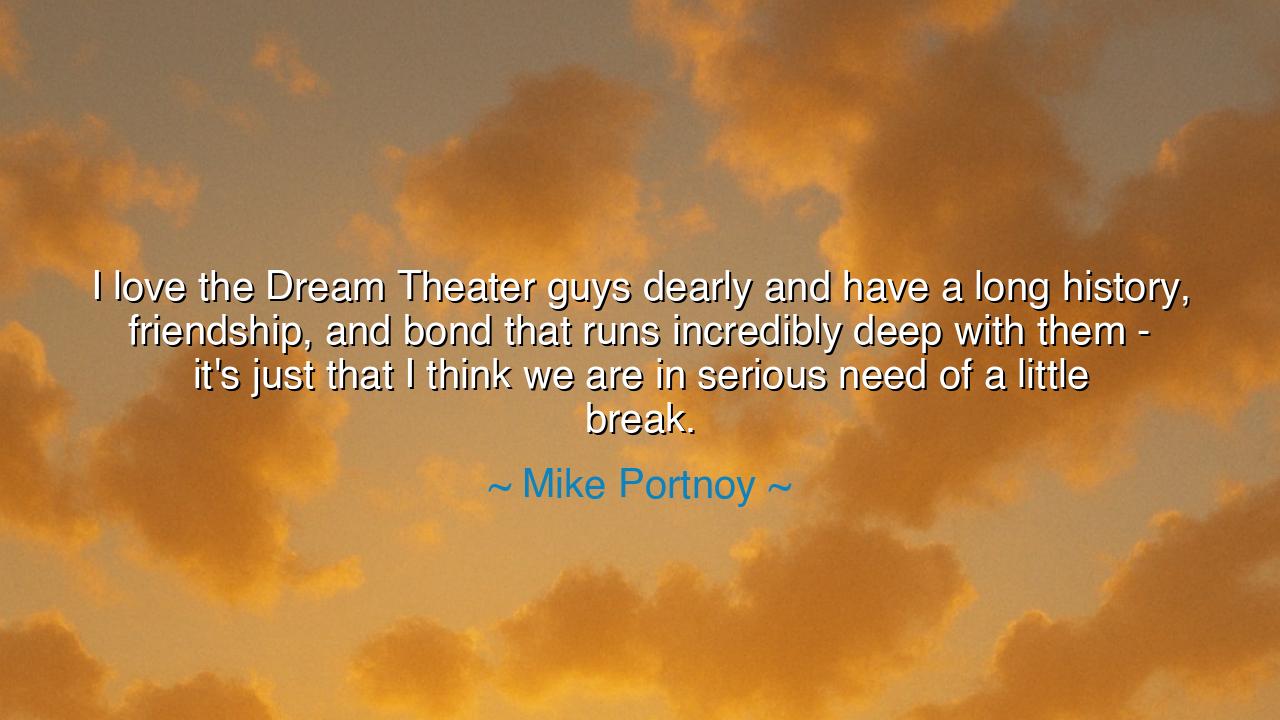
I love the Dream Theater guys dearly and have a long history
I love the Dream Theater guys dearly and have a long history, friendship, and bond that runs incredibly deep with them - it's just that I think we are in serious need of a little break.






Hear the heartfelt words of Mike Portnoy, master drummer and founding spirit of the band Dream Theater, who once said: “I love the Dream Theater guys dearly and have a long history, friendship, and bond that runs incredibly deep with them — it’s just that I think we are in serious need of a little break.” In this confession lies a wisdom both tender and profound. It speaks of love that endures even in separation, of loyalty tested by time, and of the courage to step away not out of anger, but out of care. For in the cycles of life, even the strongest bonds sometimes require distance to renew their strength. Portnoy’s words are not of farewell, but of pause — the pause that preserves what might otherwise be lost.
Mike Portnoy was not merely a musician in Dream Theater; he was its heartbeat. For over twenty-five years, he poured his soul into every rhythm, shaping the band’s sound, vision, and spirit. His bond with his fellow members — John Petrucci, John Myung, James LaBrie, and Jordan Rudess — was not just professional, but brotherly. Together they conquered the world of progressive metal, weaving music as complex as it was transcendent. Yet, like all great journeys, theirs reached a moment when the fire that once united them began to burn too intensely. Portnoy’s words came in that moment — not as a rejection of friendship, but as an act of preservation. For he understood the ancient truth that love sometimes demands space, lest it suffocate under its own weight.
In his declaration, one hears echoes of the timeless wisdom that even the closest of companions must sometimes part to rediscover themselves. The great philosopher Lao Tzu once said, “If you love something, let it go. If it returns, it is yours forever.” Portnoy’s decision mirrors this sentiment. His bond with the band remained deep, but he sensed that their shared path had grown weary, that routine had dulled their spark. Rather than let resentment fester, he chose distance — an act of both humility and wisdom. For in stepping back, he honored the sanctity of the friendship more than if he had clung to it in unrest.
History offers us many such examples. Consider Alexander the Great and his closest companion, Hephaestion. Together they conquered empires, bound by friendship and loyalty so strong it was said they shared one soul. Yet, even in their closeness, there were moments when their visions diverged. They learned that true friendship is not uniformity of thought, but unity of respect. Similarly, Portnoy’s bond with his bandmates did not end because of difference; it evolved because of it. The ancients would have called such a relationship “philia” — the noble love between comrades, tested by struggle yet enduring through time.
The “little break” Portnoy speaks of is more than a physical separation; it is a spiritual pause — the moment in a symphony where silence gives meaning to sound. Just as a musician must respect the rest between notes, so too must a friend know when to step back. To love deeply is to understand this rhythm of closeness and distance. Without pause, even beauty can grow heavy; without silence, even harmony can become noise. By choosing to rest, Portnoy did not end his friendship — he protected its purity, allowing it to breathe once more.
His words also reveal the courage it takes to be honest in love. Many would cling to familiarity, fearing that distance would breed loss. But true friendship, like the strongest steel, is not weakened by heat — it is forged in it. Portnoy’s truth teaches us that bond is not measured by constant presence, but by enduring affection. A true friend is not one who never leaves your side, but one who remains in your heart even when paths diverge. The love he expresses is not fragile; it is powerful enough to withstand change, patient enough to wait for renewal.
The lesson, then, is this: cherish your friendships, but do not imprison them. Know when to draw close and when to give space. Understand that even the deepest relationships require the air of individuality to survive. When tension grows, do not let pride or fear destroy what years have built. Instead, honor the bond by allowing it to rest, trusting that what is true will endure. For friendship, like music, is made not only of sound, but of silence; not only of nearness, but of distance that reminds the heart of its longing.
So, dear listener, remember the wisdom of Mike Portnoy. To love someone — whether a friend, a companion, or a collaborator — is to walk the delicate path between holding on and letting go. When the weight of togetherness grows too heavy, have the courage to pause. Let that “little break” be not an end, but a renewal — a sacred interlude before the next movement begins. For the truest bonds, once tested by time and distance, return stronger than ever, ringing out like music that can never be silenced — the eternal song of friendship.






AAdministratorAdministrator
Welcome, honored guests. Please leave a comment, we will respond soon